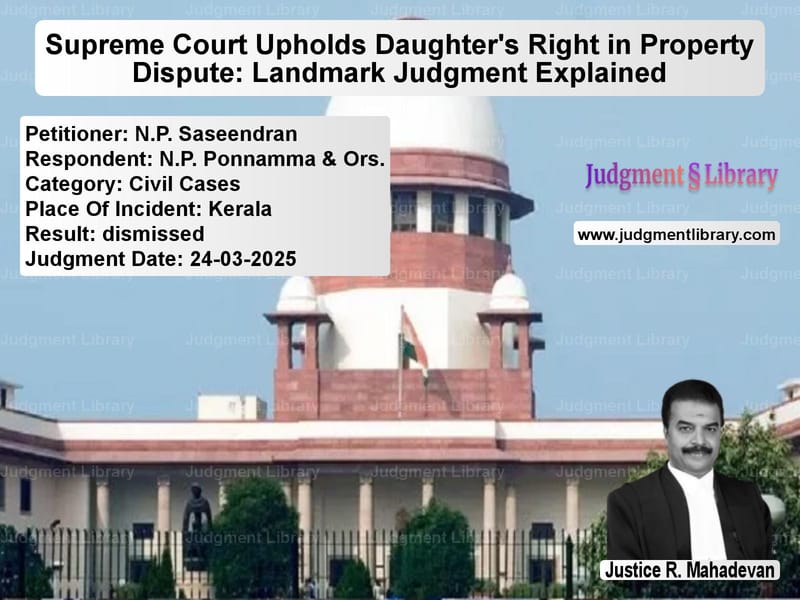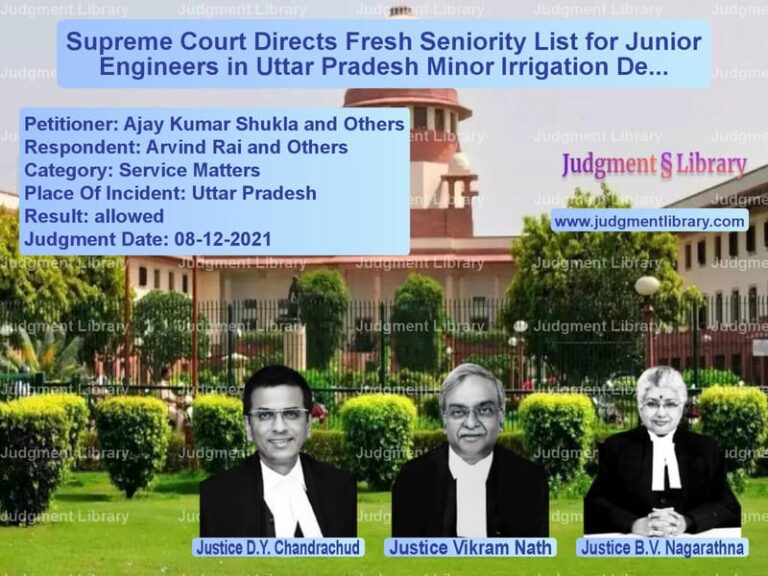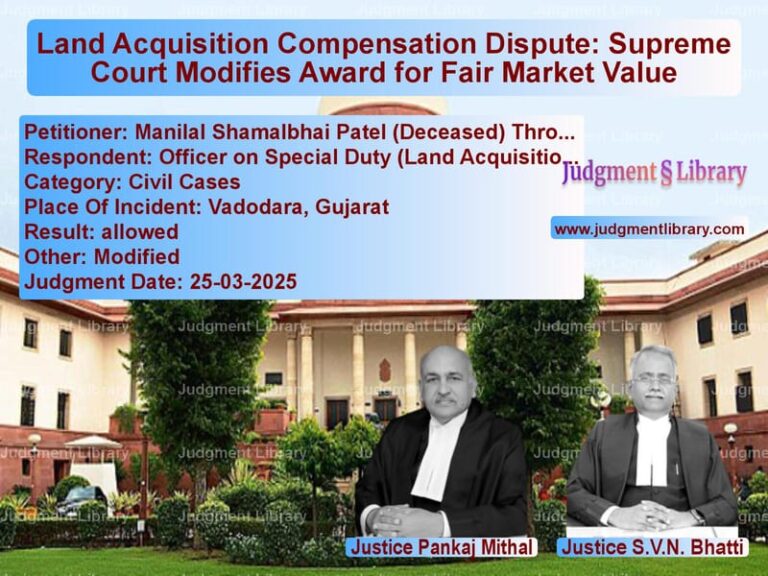Supreme Court Upholds Daughter’s Right in Property Dispute: Landmark Judgment Explained
In a landmark ruling, the Supreme Court of India delivered a judgment in N.P. Saseendran vs. N.P. Ponnamma & Ors., a case concerning the validity of a property transfer between family members. The dispute revolved around whether a 1985 document executed by the father of the parties was a gift deed or a will. The judgment, authored by Justice R. Mahadevan, overturned concurrent findings of the lower courts and affirmed the property rights of the daughter.
This decision sets an important precedent in cases involving property inheritance, gift deeds, and wills, highlighting the principles governing family property transfers under the Transfer of Property Act, 1882 and the Indian Succession Act, 1925.
Background of the Case
The legal battle began when N.P. Ponnamma (the respondent and plaintiff) filed a suit in 1994 before the Sub Court, Cherthala, asserting that she was the rightful owner of the disputed property based on a gift deed dated June 26, 1985, executed by her father (Defendant No.1). She contended that the cancellation and subsequent sale deed executed in favor of her brother, N.P. Saseendran (the appellant), were invalid.
Arguments Presented by the Petitioner
The appellant, N.P. Saseendran, contended that:
- The document executed in 1985 was a will, not a gift deed, as the father never intended to immediately transfer ownership.
- The father retained possession and control over the property during his lifetime, which indicated the document’s testamentary nature.
- Since the document was a will, the father had every right to revoke it and subsequently execute a sale deed in favor of the appellant.
- The lower courts had correctly interpreted the document as a will, and the High Court had erred in reversing their findings.
Arguments Presented by the Respondent
The respondent, N.P. Ponnamma, argued:
- The document was a gift deed, not a will, as it expressly conveyed ownership to her.
- The father had reserved only limited rights (such as the right to take income from the property), but ownership had already passed to the respondent.
- The High Court correctly held that the father had no authority to unilaterally revoke the gift deed and execute a sale deed.
- The cancellation deed and subsequent sale were void and had no legal standing.
Supreme Court’s Analysis and Findings
The Supreme Court conducted a thorough analysis of the 1985 document to determine whether it was a gift deed or a will. The key aspects considered were:
- Immediate Transfer of Ownership: The Court observed that the document conveyed ownership in praesenti (i.e., immediately) to the respondent, which is a key characteristic of a gift.
- Retention of Limited Rights: The father had retained the right to take income from the property, but this did not negate the transfer of ownership.
- Legal Precedents: The Court relied on previous judgments, including Renikuntla Rajamma v. K. Sarwanamma, which held that delivery of possession is not essential for a valid gift.
- Prohibition on Revocation: Under Section 126 of the Transfer of Property Act, a gift once made cannot be revoked unilaterally, except under specific conditions.
Verbatim Key Observations from the Supreme Court
Justice R. Mahadevan, delivering the judgment, stated:
“The nomenclature of a document is not conclusive; the substance of the document must be examined. If ownership is transferred immediately, it is a gift, regardless of any reservations the donor may have regarding the property’s use.”
“A validly executed and accepted gift deed cannot be revoked unilaterally. The cancellation deed and subsequent sale deed executed by the father are, therefore, legally void.”
Final Judgment and Ruling
The Supreme Court upheld the High Court’s decision, ruling in favor of the respondent. The Court declared:
- The 1985 document was a gift deed, not a will.
- The cancellation deed and subsequent sale deed were null and void.
- The respondent’s ownership of the property was reaffirmed.
- The appeal filed by the appellant was dismissed.
Implications of the Judgment
This judgment has far-reaching implications for property disputes involving family settlements. Key takeaways include:
- Gift deeds, once executed and accepted, are irrevocable.
- Possession is not a prerequisite for the validity of a gift deed.
- Courts will look at the substance of a document, not just its title.
- Revocation of a gift must meet legal conditions under the Transfer of Property Act.
By reaffirming these principles, the Supreme Court has provided clarity and stability in property law, ensuring that legitimate gifts cannot be arbitrarily revoked.
Petitioner Name: N.P. Saseendran.Respondent Name: N.P. Ponnamma & Ors..Judgment By: Justice R. Mahadevan.Place Of Incident: Kerala.Judgment Date: 24-03-2025.
Don’t miss out on the full details! Download the complete judgment in PDF format below and gain valuable insights instantly!
Download Judgment: n.p.-saseendran-vs-n.p.-ponnamma-&-ors.-supreme-court-of-india-judgment-dated-24-03-2025.pdf
Directly Download Judgment: Directly download this Judgment
See all petitions in Property Disputes
See all petitions in Succession and Wills
See all petitions in Specific Performance
See all petitions in Contract Disputes
See all petitions in Damages and Compensation
See all petitions in Judgment by R. Mahadevan
See all petitions in dismissed
See all petitions in supreme court of India judgments March 2025
See all petitions in 2025 judgments
See all posts in Civil Cases Category
See all allowed petitions in Civil Cases Category
See all Dismissed petitions in Civil Cases Category
See all partially allowed petitions in Civil Cases Category







